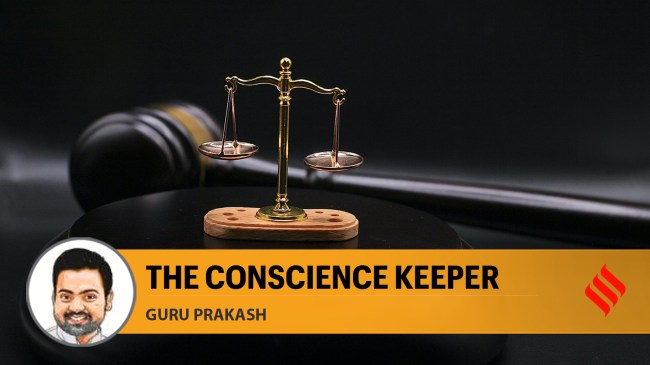Opinion Judiciary’s role is to be principled, not popular
The Delhi High Court’s refusal to dilute UAPA in Umar Khalid’s case is not about silencing dissent — it is about ensuring that cases involving violence are subject to rigorous scrutiny in courts.
 B R Ambedkar’s final speech in the Constituent Assembly is relevant today. He reminded us that ‘constitutional morality is not a natural sentiment.
B R Ambedkar’s final speech in the Constituent Assembly is relevant today. He reminded us that ‘constitutional morality is not a natural sentiment. Last week, the Delhi High Court refused bail to Umar Khalid and nine others accused in a conspiracy case related to the 2020 Delhi riots. The verdict was followed by political commentary, social media outrage, and television debates. However, if we disregard the noise, a larger truth emerges: India’s judiciary remains steadfast in the face of pressure and is guided not by personalities or ideologies, but by the Constitution.
The Khalid case is not just about one individual. It is about how the judiciary approaches politically charged cases, how it interprets liberty under special laws, and most importantly, how citizens must continue to repose faith in institutions — even when court verdicts are inconvenient.
India’s judiciary has never shied away from protecting liberty when the law demands it. It has struck down unconstitutional arrests under Section 66A of the IT Act in Shreya Singhal (2015). In 2017, the Supreme Court (SC) affirmed privacy as a fundamental right in Puttaswamy, and a year later, it decriminalised Section 377, restoring dignity to millions. Courts have shown equal alacrity in upholding the need for caution in cases involving terror, money laundering, and narcotics. In performing this dual role — protecting liberty while safeguarding national security— the judiciary has been true to its mandate of maintaining constitutional balance. There is a message in the way the judiciary has gone about this task: Faith in institutions cannot be selective. One cannot hail the judiciary when it strikes down laws we dislike, and dismiss it as biased when it denies bail to someone we support.
B R Ambedkar’s final speech in the Constituent Assembly is relevant today. He reminded us that “constitutional morality is not a natural sentiment. It has to be cultivated”. He meant that true democracy rests not just on rights and freedoms, but on the discipline that comes with respecting institutions. Ambedkar warned us against bypassing constitutional methods for achieving political goals. Sadly, most commentaries today, which accuse the courts of being biased, ignore this caveat. But, as Ambedkar underlined, the judiciary’s role is not to be popular; it is to be principled.
This is why the Citizenship Amendment Act (CAA) must be seen in its true light. The law is intended to benefit the most marginalised: Hindus, Sikhs, Buddhists, Jains, Parsis, and Christians fleeing persecution in Pakistan, Afghanistan, and Bangladesh. Consider the Dalit Hindu refugees in makeshift camps near Jodhpur, or the Bengali Hindu families in Assam who fled targeted violence decades ago, or the Sikh and Christian families in Kabul forced to abandon everything to escape the Taliban. They are among the most voiceless communities in South Asia. The CAA is designed as a constitutional shield for them. Far from undermining secularism, it is a social justice initiative that recognises the lived reality of persecution and is true to Ambedkar’s vision of constitutional morality.
In 2019, people accepted the SC’s Ayodhya judgment with equanimity. In 2022, institutions stood firm after the Court’s verdict in Zakia Jafri. In the Sohrabuddin case, critics alleged political pressure, but appellate courts found no fault with the trial court’s reasoning. And now, while the Khalid bail verdict is being fiercely debated, no serious observer can accuse the Delhi High Court of ignoring the law.
This resilience matters. It shows that even in the age of hashtags and viral outrage, judicial pronouncements continue to shape public morality.
The judiciary cannot solve every problem. But in a democracy, it acts as the conscience-keeper. The Delhi High Court’s refusal to dilute UAPA in Umar Khalid’s case is not about silencing dissent — it is about ensuring that cases involving violence are subject to rigorous scrutiny in courts. Prime Minister Narendra Modi and Union Home Minister Amit Shah are living examples of leaders who faced the judiciary’s toughest questions and emerged vindicated, because they trusted the system. The Ram Temple is an example of how a centuries-old dispute was resolved through law, not violence. And, the CAA is an example of how legislation can uplift the most marginalised.
Ambedkar’s words remind us that democracy survives on the strength of institutions. If we continue to place our faith in institutions, the Constitution will not be seen as a book of law. It will remain, as Ambedkar intended, the guiding spirit of India’s collective life.
The writer is national spokesperson of the BJP






